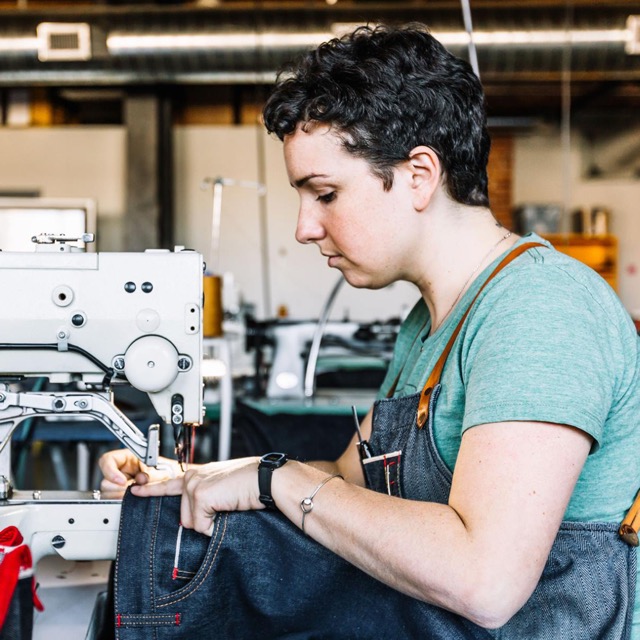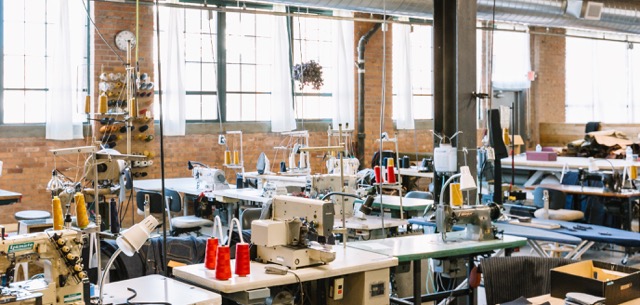Detroit Denim makes sturdy jeans, by hand, with less waste
Even after graduating from the makerspace Ponyride into a bigger production facility and storefront, Detroit Denim has dreams of scaling up further.

Brenna Lane has been sewing a long time—ever since her grandmother taught her when she was seven years old. But with a graduate degree in anthropology, she never thought it would be anything more than a hobby.
At least that was the case until 2012 when she answered a Craigslist ad for an industrial sewer with Detroit Denim Co., a jean manufacturing company with a total staff of one, founder Eric Yelsma. Though the ad only called for a part-time worker, Lane started showing up every day. Yelsma couldn’t pay her for this extra work, so just after four months of employment, she asked for an equity stake in the company and became a partner.
That decision has paid off in more ways than one. Last year, Detroit Denim relocated from the business incubator and makerspace Ponyride to a bigger production facility and retail space in Harbortown on Detroit’s eastside. They also now employ six additional people, produce many more jeans (in addition to bags and aprons), and have dreams of scaling up even more.
But they won’t do so if it means sacrificing company values. While Detroit Denim rekindled Lane’s passion for sewing, it’s the company’s other features that have kept her there.

That’s especially true of Detroit Denim’s efforts to minimizing waste—nearly every feature of the company relates back to this principle. It starts with the materials—100 percent U.S.-sourced—and continues through the entire production and sales process.
Each pair of Detroit Denim jeans is handmade and takes around four hours to make. While that’s significantly longer than an industrial-scale manufacturer, it results in less human-error and waste. “If we’re two hours in and a stitch is wrong but it doesn’t affect the integrity of the jean, we’ll match the other stitches to it,” says Lane. “Each pair has its own character and charm.”
The company makes about 40 pairs of jeans a week, many of which are custom or limited runs. Because of their scale, Detroit Denim doesn’t have a minimum order.
But that scale often results in sticker shock for customers—at $250 a pair, Detroit Denim jeans aren’t cheap. “We can’t compete with the prices of overseas manufacturers,” says Lane. “But we can compete on quality.”
Thanks to their high-quality selvedge denim, which has a denser and therefore sturdier weave, the jeans last considerably longer. They’ll also last longer because the incentive to care for the jean is woven, so to speak, into the cost. “Textile waste is huge problem,” says Lane. “People tend to think of clothing as disposable. But when you have a higher price point, it encourages the customer to fix it and get more life out of it.”
Detroit Denim has a guide on their website for increasing the duration of jeans and offers a lifetime repair guarantee. Bring your jeans into the shop, and they’ll patch any holes and repair broken pockets or belt loops.
Another advantage is a much better fit. Detroit Denim offers unique cuts that fit a number of body types that haven’t been traditionally marketed to. ‘I’d do tweaks, minor alterations, and I started to see patterns,” says Lane. “I said, ‘I’ve seen this alteration quite a few times, so why don’t we put it on the line?’ We now have four cuts based on our interactions with customers.”

The company’s new headquarters, where a wall of windows divides the storefront and production facility, is in a way its own justification for the jeans’ expense. “A lot of people are divorced from an understanding of where clothes come from,” says Lane. “Eric [Yelsma] likes to say, ‘If you don’t know where your clothes came from, then you know where they came from.'”
Yelsma is referring to the cheap overseas labor that makes nearly all the brand-name jeans sold in North America, and which allows them to sell pairs for $50. “It’s really important to us for the customer to form a closer relationship to their clothes,” says Lane. “We want them to know who made them, how they were made, what went into making them. We want to educate the customer and help them understand why they’d want to pay more.”
That labor is also one of the major challenges Detroit Denim faces as it looks to scale—it’s difficult to find skilled industrial sewers. “We’re in a bit of a bubble here,” says Lane. “It’s not Los Angeles or the Carolinas where there’s a lot of cut-sew activity.”
Other priorities for the company include raising more capital and producing a line of women’s jeans.
But one thing is for certain: as they continue to find skilled sewers, and customers receptive to their message, Detroit Denim will continue to grow.
Want to learn more about Detroit Denim? Brenna Lane will share her experience growing the company during our upcoming High Growth Happy Hour event at 3rd Street Bar on Thursday, April 27, from 6 p.m. to 8 p.m. Find more information and RSVP here for this free event. We hope to see you there!




